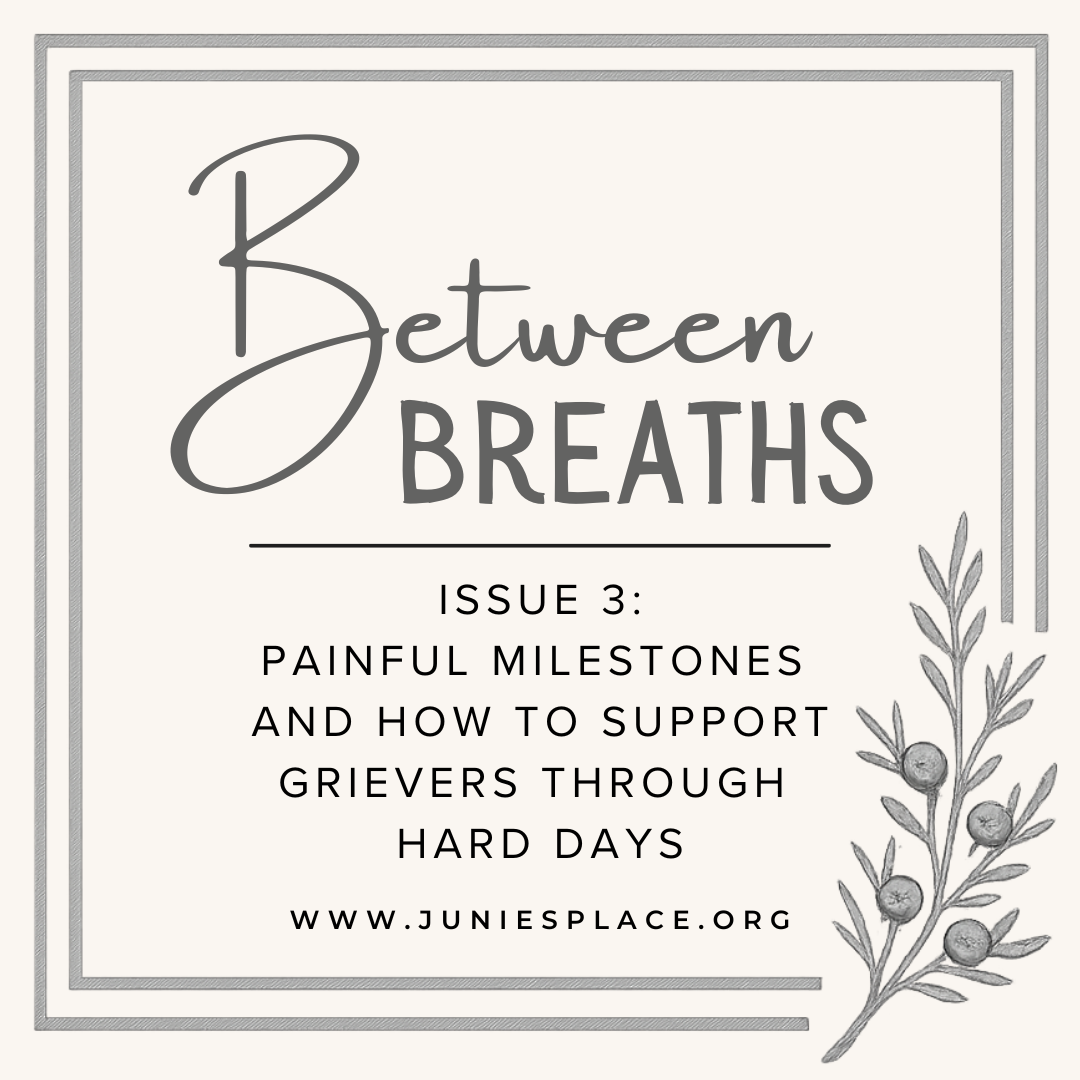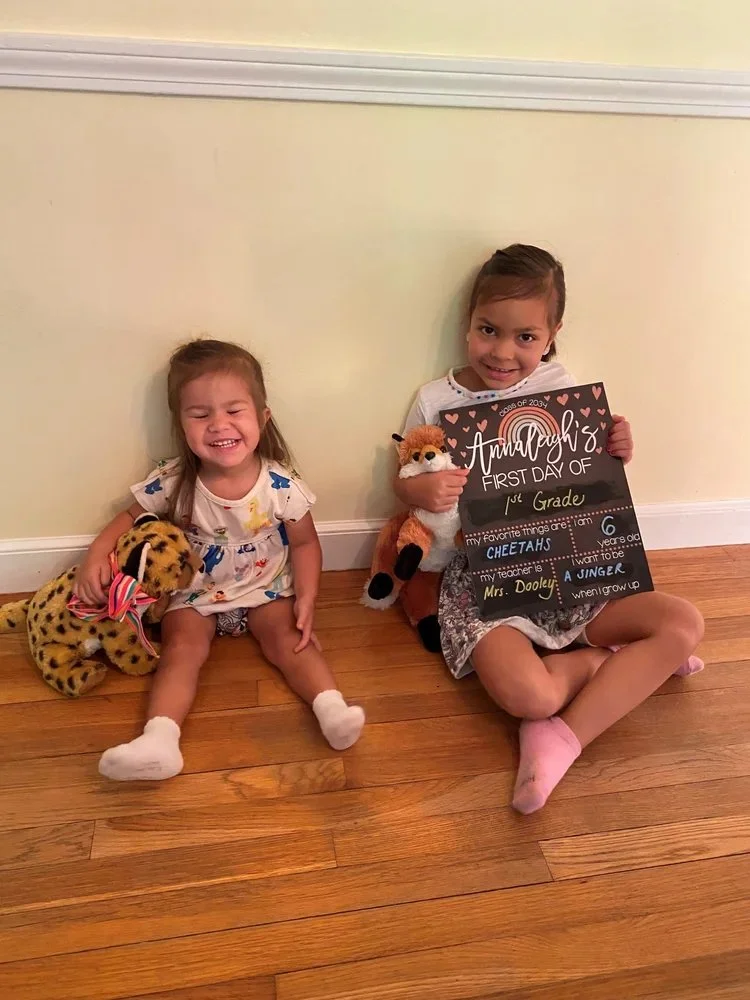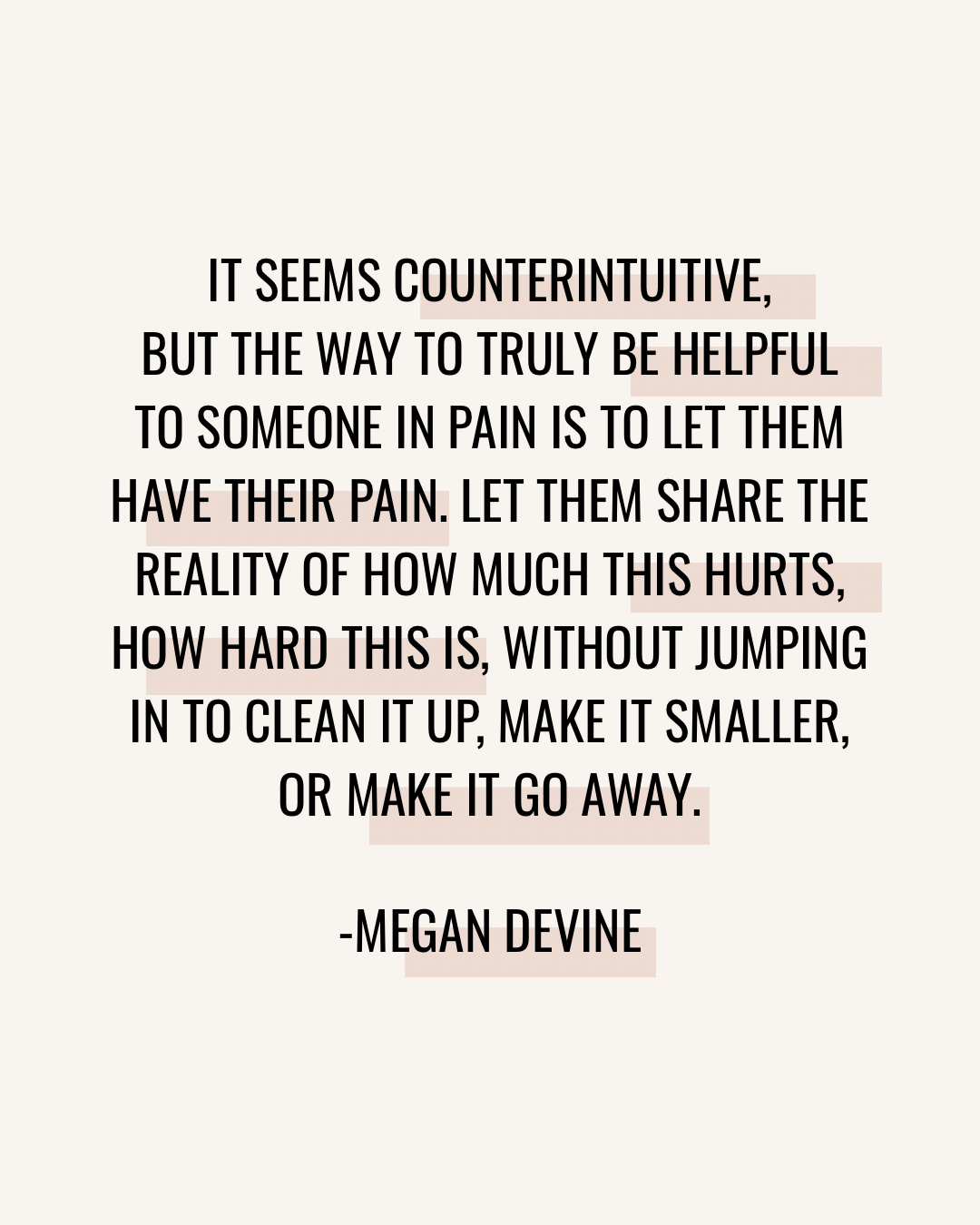Between Breaths Issue 3: Painful Milestones and How to Support Grievers Through Hard Days
I longed for summer to end - you heard my plea in my last newsletter.
Grief feels most at home in the winter, and autumn’s falling leaves set the path there. I still welcome autumn, and yet, with it comes a dreaded milestone: the beginning of the school year.
This year, my daughter Junie would have entered kindergarten — one of the biggest events and rites of passage in a young child’s life. I can imagine taking her and Annaleigh back-to-school shopping. I can picture her picking out a backpack and having her name lovingly inscribed on it.
But my sweet girl didn’t get that opportunity. She didn’t get to choose first-day outfits or learn the name of her teacher. She didn’t get to wear a backpack or climb onto the bus for her first day.
Milestones in a griever’s world are deeply painful. They are reminders of what should have been and never will be. They tug at the fabric of our lives, revealing once again how unfair it all is. While others are celebrating graduations, birthdays, and weddings, we are reflecting on the voids within us — the places where hope, joy, and excitement used to live.
While you celebrate these milestones, we often must watch from the sidelines, cheering you on, yet desperate to be part. We try not to let envy consume us, yet the question, “Why my child?” devours us.
In these moments, we hope our children are remembered and our grief acknowledged. Some of us want to be invited to your celebrations, while others among us prefer to watch from a distance. I hope you give us that choice. Even if we say no, it’s comforting to know we — and our children — were considered.
And more than considered, our deepest wish is for our children to be honored. To be included. We want you to say their names, to remember them out loud, to carry their spirit into your lives. We know it may not feel fair to ask that of you, but it’s what we long for: that you join us in the work to keep our children present. When you do, it is a beautiful, unexpected gift. For a moment, we can exhale, because you’ve breathed life into them, and into us.
For those who care for a griever, these milestones are sacred opportunities to show support and deepen connection. We don’t expect to be included in every celebration, or for our child to be honored at every event, but a simple gesture, a moment of thoughtfulness, can mean the world. Here are some ideas:
Have a symbol or item that represents our child present
Include their name on a program
Leave an empty seat or place setting in their honor
Reach out to let us know you’re thinking of them
Wear a specific color in their memory
Donate to a cause in their name
Have a moment of silence
Light a candle
Create a memory table
Serve their favorite food
Do an act of kindness in their honor
It’s not your responsibility to carry our grief, but your willingness to help hold it makes it a little lighter, a little more bearable. Please consider how you might show up for the grievers in your life in this way. It doesn’t matter if it’s been weeks, months, or decades — we will always want our children to be remembered.
It was your turn, darling.
Between Breaths Issue 2: The Seasons of Grief
Grief makes sense in the winter.
For many, both in grief and not, the long cold winter months can be a time for respite, retreat, and solitude. The shift into colder weather and shorter days requires us to slow down and spend more time within the walls of our home and within ourselves. Grief settles into this space. It takes advantage of the time to reflect and sit with the various emotions as they emerge. As Angie Weiland-Crosby says, “Winter knows how to hush, still, listen, so the soul can speak.”
Not that grieving in winter is simple. In winter, we must face the challenges of holidays and expectations around joy and gatherings. Perhaps winter allows us the space and time to manage those difficult times at our own pace. Though we may emerge weary from battle, we also have had the time to process and reflect.
Spring brings transition. It coaxes us out of our stupor with the promise of new beginnings. Though still drowsy, we emerge from the darkness with hopes high as we face the sun. Yet the weariness of grief still lingers, like the frost that blankets a spring morning.
And then comes summer. Oh, summer. Summer does not hush nor does it offer stillness. Instead, it blazes around us.
Summer is hot and oppressive and demands to be seen and felt. We seem only to be settling into spring when the rest of the world begins to anticipate the heat and long days. Those who were quiet during the winter months begin to excitedly chatter about the end of the school year and summer plans. While others eagerly anticipate summer’s arrival, we sit with our faded photos and corners of book pages folded down on memories from summers past. The transition into summer asks us to gather and bask, while we may still long for dormancy and hibernation.
So, we shed our winter coats and join others in the sunlight. We engage, and play, and pretend. At times we actually do feel joy before being swept away by the undertow of guilt. How could we possibly enjoy anything without our loved one? There was a sorrowful comfort to the chill of winter; the very light of summer aims to burn away sorrow. This leaves us feeling conflicted and confused as we navigate the demands of summer and our own experience.
However, in spite of this, we can choose to turn toward the light of summer. While winter encourages us to be still, summer calls on us to engage while taking a break from our typical responsibilities. It can be an opportunity to be in nature, spend time with loved ones, take time from work, travel, and participate in hobbies. Grief has a place in summer, too, and we are allowed to enjoy what the warmer months have to offer.
Though this time may be challenging in its own way, take the time to make the best of your summer. Once the crisp air returns and trees begin to lose their leaves, we will take solace in knowing that the seasons continue on. So, when the temperatures soar, trust that with nurturing, even the most delicate flowers can bloom. And remember, grief has its place in every season — resting in winter’s hush, emerging in spring’s thaw, standing in summer’s blaze, and shedding in autumn’s breeze.
Between Breaths Issue 1: How to Get Grief Wrong and Still Be Right
First things first, grief is complicated, yet we want to talk here in a way that is digestible and accessible. Two things in grief can be true at once. On the one hand, there is no prescription for how grievers and supporters walk this path together. And, at the same time, there are missteps that can be made along the way.
We will talk here about getting grief support “right” and “wrong,” yet grief is a highly individualized experience, constantly shifting and changing. As a result there are moments where grief supporters may feel like they are getting it wrong.
In today’s edition we will explore the simplified concept of right and wrong support.
Showing up means more than getting it “right.”
Let’s face it - most of us feel uncomfortable with grief, which means that we likely feel uncomfortable with grievers. We don’t know what to say, we are afraid of making them sad, we have our own anxieties around death. There are so many reasons that make it hard to be present for grievers. Yet, that’s exactly what our grieving friends, family, and coworkers need. They need us to show up and stay put!
So, you won’t know what to say and you might get it “wrong” - that’s OK! The people who are willing to learn from their missteps tend to become the most significant people in one’s grief journey.
My dear friend, Marie, is one of those people. Throughout my grief, she has never shied away from my pain and has been willing to walk with me through the messiness of my grief. More importantly, she’s been willing to get it wrong.
When I first lost Junie, I shared how I missed the weight of her. I missed her on my hip, I missed her sprawled across my lap, I missed her tiny arms wrapped tightly around me. When I expressed this to Marie, she immediately went into problem solving mode - “Maybe you could hug yourself.”
Cue record scratch.
Hug myself? My two and a half year-old daughter had just died, and she wanted me to give myself a hug?
I’m not sure exactly what I said to Marie in that moment, but I know I expressed that was not what I wanted, nor needed to hear. I didn’t want a solution - there was no solution. And there was no way to fix my grief or ease my pain.
Marie offered a solution-focused suggestion to my grief, which is not uncommon. As a society, we love quick fixes, the notion of healing, and the absence of sadness and pain. However, in grief, there is nothing to be solved nor is there a solution. Grievers are entitled to their pain and need it both to be felt and seen by others. In that moment with Marie, I simply wanted someone to bear witness to my suffering without judgment or offers of reprieve. I wanted someone to simply be present as I waded into the depths of despair.
And so, that’s what Marie did. She has been present with me, physically and emotionally, throughout my grief. She got it wrong, and in spite of that, continued to show up. She reaches out on days she knows will be hard - heck, sometimes before I even realize. She’s not afraid to make me sad by talking about Junie. She refrains from discussing aspects of her beliefs that I don’t find helpful. She sends me texts letting me know she has done an act to honor Junie. And as a result, Marie has become a trusted and welcomed companion on my journey. What is remarkable is that the more one falters in supporting a griever, the more one learns and has the opportunity to get it right.
Marie deeply wanted to understand how to support me in my grief, and if you are reading this, my guess is that you, too, want to support the grievers in your life. Here are a few practical suggestions for showing up:
Reflect on your own discomfort. What are you worried about? Saying the wrong thing? Thinking about death? Making it worse? Having awareness of your own concerns can be the first step as you consider how to support the grievers in your life.
Avoid offering solutions. Though they are well-intentioned, we know nothing will fix grief.
Be willing to tolerate pain and sadness. Grief is riddled with both, and though it can be hard to see someone you care for in pain, remember that their emotions are valid and normal.
Don’t shy away from asking them about their grief. When is it worst? What are their triggers? What have they learned? How do they need you to show up?
And finally, understand that you’ll likely get it wrong and take it as an opportunity to learn. What was it that went wrong? How did the person react? What feedback can you elicit to get it right next time?
Grief is neither easy nor simple, but your willingness to show up for grievers in your life means more than you could ever imagine. So keep trying, and even when you falter, remember that your griever needs you there beside them.
We hope you enjoyed the first of Between Breaths. This feature will also be available on our newsletter, so hit subscribe! If you have questions, comments, or would like us to share your story, please reach out!




